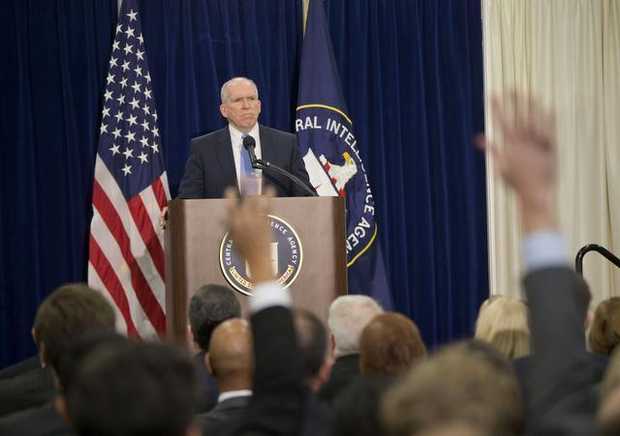Editor’s Note – John Brennan, CIA director had to take to the interview stage thanks to the furor raised over the release of the Senate Select Committee’s one-sided report on the CIA as presented by Chairwoman Diane Feinstein.
It was unprecedented and very rare indeed, but that is the level to which this explosive story had risen and he had to defend his agency and its work force.
What is torture? Why weren’t people at the CIA interviewed? What was the state of our security when the enhanced interrogation techniques were used?
Was any information from these interrogations useful? What is the damage now that the report was made public by Diane Feinstein, Chairwoman of the Senate Select Committee on Intelligence?
These questions and more faced John Brennan, and therefore all of America and our allies, even our enemies. Then we have to consider the state of morale in the CIA and the intelligence community overall?
In addition, what will foreign nations’ intelligence and law enforcement services think, and how will they work with us in the future? These were some of the other question he faced from the press.
Ask yourself, do you really understand how the “trade craft” of the CIA really works? Throw out your Hollywood images and James Bond.
Also consider that only documents were used to create the report – all sans context, frame of mind, and interviews.
No court or self-respecting prosecutor in the land would ever enter this type of so-called evidence into a trial for a jury to decide but Diane Feinstein demands that you, the real jury, consider only her and the Democrats take on the issue.
In our opinion, we watched and came to the conclusion that Brennan comported himself rather well.
He acknowledged failures and mistakes while refuting implausible conclusions and the damage they have caused.
For a good summary on these questions and the speech/interview, please read on:
CIA chief challenges Senate torture report
By KEN DILANIAN – Associated Press/Washington Times
WASHINGTON (AP) – CIA Director John Brennan threaded a rhetorical needle in an unprecedented televised news conference at CIA headquarters Thursday, acknowledging that agency officers did “abhorrent” things to detainees but defending the overall post-9/11 interrogation program for stopping attacks and saving lives.
At the heart of Brennan’s case is a finely tuned argument: that while today’s CIA takes no position on whether the brutal interrogation tactics themselves led detainees to cooperate, there is no doubt that detainees subjected to the treatment offered “useful and valuable” information afterward.
Speaking to reporters and on live television- something no one on the CIA public affairs staff could remember ever happening on the secretive agency’s Virginia campus -Brennan said it was “unknown and unknowable” whether the harsh treatment yielded crucial intelligence that could have been gained in any other way.
He declined to define the techniques as torture, as President Barack Obama and the Senate intelligence committee have done, refraining from even using the word in his 40 minutes of remarks and answers. Obama banned torture when he took office.
He also appeared to draw a distinction between interrogation methods, such as water boarding, that were approved by the Justice Department at the time, and those that were not, including “rectal feeding,” death threats and beatings. He did not discuss the techniques by name.
“I certainly agree that there were times when CIA officers exceeded the policy guidance that was given and the authorized techniques that were approved and determined to be lawful,” he said. “They went outside of the bounds. … I will leave to others to how they might want to label those activities. But for me, it was something that is certainly regrettable.”
But Brennan defended the overall detention of 119 detainees as having produced valuable intelligence that, among other things, helped the CIA find and kill al-Qaida leader Osama bin Laden.
A 500-page Senate intelligence committee report released Tuesday exhaustively cites CIA records to dispute that contention.
The report points out that the CIA justified the torture – what the report called an extraordinary departure from American practices and values – as necessary to produce unique and otherwise unobtainable intelligence. Those are not terms Brennan used Thursday to describe the intelligence derived from the program.
The report makes clear that agency officials for years told the White House, the Justice Department and Congress that the techniques themselves had elicited crucial information that thwarted dangerous plots.
Yet the report argues that torture failed to produce intelligence that the CIA couldn’t have obtained, or didn’t already have, elsewhere.
Although the harshest interrogations were carried out in 2002 and 2003, the program continued until December 2007, Brennan acknowledged. All told, 39 detainees were subject to very harsh measures.
Former President George H. W. Bush, CIA director in 1976-77, supported the agency.
“I felt compelled to reiterate my confidence in the agency today, and to thank those throughout its ranks for their ongoing and vitally important work to keep America safe and secure,” Bush said in a statement.
Former CIA officials, including George Tenet, who signed off on the interrogations as director, have argued in recent days that the techniques themselves were effective and justified.
Brennan’s more nuanced position puts him in harmony with an anti-torture White House while attempting to mollify the many CIA officers involved in the program who still work for him.
Sen. Dianne Feinstein, the intelligence committee chairman whose staff wrote the report, conducted a live-tweeting point-by-point rebuttal of Brennan’s news conference, at one point saying that Brennan’s stance was inconsistent with the original justification for the brutal interrogations.
“EIT authority (was) based on vital, otherwise unavailable intel,” she tweeted during Brennan’s remarks. “Not ‘useful information.'”
At the CIA, Brennan spoke next to the stars engraved on a marble wall to memorialize fallen officers. He criticized the Senate investigation, saying, for example, it was “lamentable” that the committee interviewed no CIA personnel to ask, “What were you thinking?”
Seeking to put the controversy in context, Brennan stressed that the CIA after the attacks of Sept. 11, 2001, was in “uncharted territory,” having been handed vast new authorities by a president determined to thwart the next al-Qaida attack.
“We were not prepared,” said Brennan, who was deputy CIA executive officer at the time. “We had little experience housing detainees, and precious few of our officers were trained interrogators.”
In starker terms than CIA officials have used previously, Brennan, a career CIA analyst, acknowledged mistakes when the agency took captured al-Qaida operatives to secret prisons and began using brutal methods in an effort to break them.
“In a limited number of cases, agency officers used interrogation techniques that had not been authorized, were abhorrent and rightly should be repudiated by all,” he said. “And we fell short when it came to holding some officers accountable for their mistakes.”
But he also said, “The overwhelming majority of officers involved in the program at CIA carried out their responsibilities faithfully. … They did what they were asked to do in the service of our nation.”
Brennan denied that the CIA intentionally misled lawmakers.
“We take exceptional pride in providing truth to power,” he said pointedly, “whether that power agrees with what we say or not and regardless of political party.”
He praised the CIA’s work to prevent terrorism on U.S. soil, and the fact that CIA officers were the first to fight and early to die in the Afghanistan war. The CIA, he said, “did a lot of things right” in a time when there were “no easy answers.”
Brennan said that while he personally believes brutal interrogations result in too much false information, he would not rule out that such tactics being used again.
“We are not contemplating at all getting back into the detention program using any of those EITs,” he said when asked whether “enhanced interrogation techniques” could again be employed. “So I defer to the policymakers in future times when there is going to be the need to be able to ensure that this country stays safe if we face a similar type of crisis.”
___
Associated Press writers Calvin Woodward and Nancy Benac contributed to this report.




